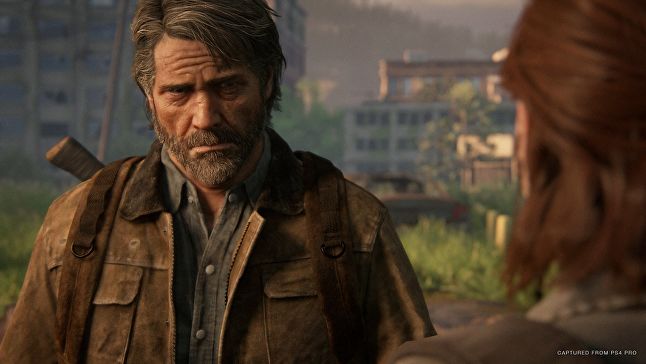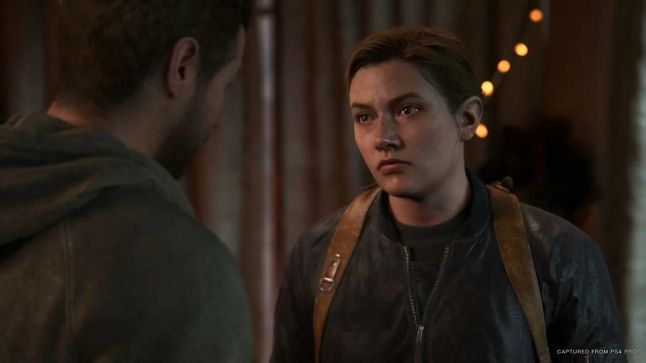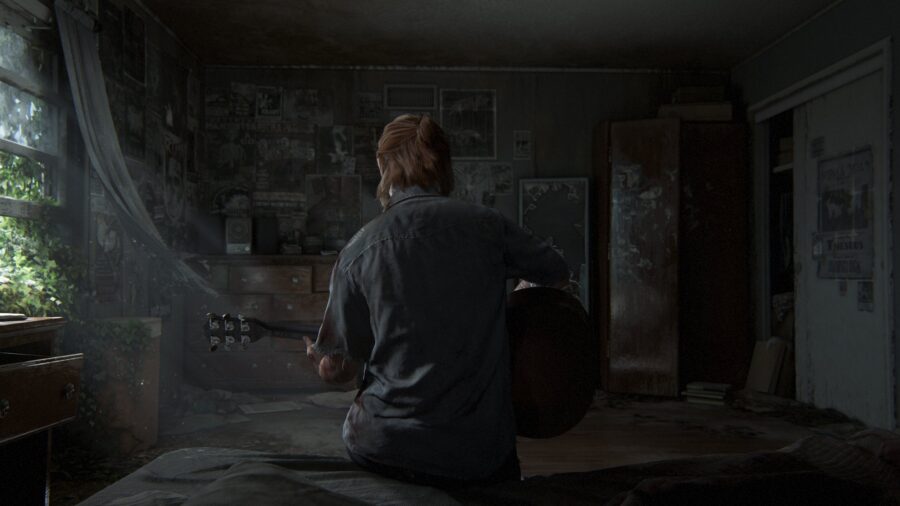Why I Love is a series of guest editorials on GamesIndustry.biz intended to showcase the ways in which game developers appreciate each other’s work. This entry was contributed by Ollie Jones, co-founder and creative director of Swamp Motel, the theatre, film and gaming hybrid company behind ARGs Plymouth Point, The Mermaid’s Tongue, and The Kindling Hour, as well as the London-based Resident Evil 2 Safe House experience.
Note: This piece will contain massive spoilers for The Last of Us: Part 2.
One of my favorite things about The Last of Us: Part 2 is hidden in the title. It’s the word “part.”
How easy it would have been to slap on a number at the end and bill it as a traditional sequel? Something aimed towards fans of its predecessor, but also an accessible jumping off point for newcomers looking to hop on board with the latest blockbuster. The Last of Us: Part 2 staunchly neglects that latter category, heavily implying that it is absolutely imperative that you play through the first The Last of Us to appreciate this follow-up chapter.
The reason for this is simple: The Last of Us: Part 2 relies so heavily on our emotional connection to the characters and events in the first game that it would lose the bulk of its impact if you hadn’t gone through its predecessor in full.
The Last of Us: Part 2 is first and foremost a tale of revenge. Our teenage heroine Ellie’s surrogate father Joel is viciously murdered and we must avenge him. It’s a simple premise on its surface. How many stories have we seen where someone’s family member is murdered and they go off on a quest for vengeance? And typically these premises can fall a bit flat emotionally, as there isn’t enough time to develop the person who gets murdered, so you take the protagonist’s word for how indispensable the dead person was.
“The Last of Us: Part 2 might be among the most emotionally manipulative games I’ve played, and I mean that as a compliment”
But with The Last of Us: Part 2, we’ve already spent countless hours playing as Joel, fervently undergoing his hardships over the course of the first game — as well as the opening of this second act. We as players have been waiting eight years to spend more time with Joel, to hear more of his story and follow his character arc — especially to see how his relationship with Ellie has grown. All the pieces are in place to undergo this new journey with him. And then he gets killed in the opening act.
It’s a devastating, shocking scene. Lots of franchises kill off beloved characters in big dramatic ways, but this typically happens at the end of a film or TV series, when you know the story is about to end anyway. Snuffing the series’ protagonist so early was such an audacious, upsetting move that played upon our expectations in a clever way. The Last of Us: Part 2 might be among the most emotionally manipulative games I’ve played, and I mean that as a compliment. It understands story structure and audience expectations, and it knows how to subvert them in upsetting ways. It’s intentionally aggravating, and that’s the point. It’s about an angry character going on an angry journey, and It’s your own anger that carries you forward. Joel wasn’t just taken from Ellie, he was taken from us as well.

This deliberately unpleasant subversion of expectations is made even more drastically at the game’s midpoint where it switches perspectives to that of Joel’s murderer, Abby.
“Abby’s story is an exercise in using the player’s baggage as an outside participant against us”
Leading up to this switch, everything in the game is signposting that it’s about to end. Ellie has slain all but one of the team responsible for Joel’s murder; we’ve just gone through a harrowing stormy boat ride, which feels as climactic and ominous a setting as you can get; and getting to this point takes roughly the same amount of time that it does to play through the entirety of the first The Last of Us. It’s a hugely climactic setup. But then rather than give us the closure we’ve been building up to for umpteen hours, we’re suddenly spirited away to a flashback of Abby’s childhood.
My reaction — along with most people’s as far as I can tell — was “I don’t care about Abby! Let’s get on with the story!” I could understand the point it was trying to make straight away: that everyone has their own story to tell and a villain in one story can be a hero in another’s. But did it need to make me play through a dozen hours as this alleged antagonist to make it? It turns out it did!
Abby’s story is an exercise in using the player’s baggage as an outside participant against us. We’re taught from the off to hate this person. Not only does she viciously murder Joel by smashing in his skull with a golf club, but she does it after Joel literally saves her life from a swarm of infected. Furthermore, she’s the only playable character who wasn’t featured in the first game eight years prior. We have no attachment to this character, so trying to tell her story now, after all this, seems like too little too late. And that’s what makes it brilliant!
It’s only because we begin her story hating her, that we feel like it’s going to be impossible to get us attached to her by the end. And yet Naughty Dog managed to do just that. We don’t just get a flashback to her traumatic childhood, sparked by Joel murdering her surgeon father (an extra in the climax of the first game), but we get to see all that she’s going through. We see her trying to rescue children from an enemy tribe. We see her trying to save her ex-boyfriend who refused an order to execute an unarmed old man. We see her grapple with her fear of heights. By the end, I may have liked her even more than Ellie!
The Last of Us: Part 2 is an exhaustive game, and it’s that exhaustion that’s key to creating the bond that it does with its cast. I’ve heard some people say that The Last of Us: Part 2 is too long or has pacing issues, but for me the size and scope of it was absolutely essential in creating as nuanced a conflict as it does.

One of The Last of Us: Part 2’s most interesting narrative techniques is in how much it plays with chronology. It’s only in the game’s final scene that we truly understand why Joel’s death was as meaningful as it was to Ellie, as she was just on the cusp of forgiving him, suggesting a bright, hopeful path forward for our fan-favorite duo. Only this information is withheld from the player the entire time. I know some found this upsetting, as they wished it had been disclosed earlier to help us identify with Ellie more as she’s embarking on her bloodthirsty quest, but to me it worked as it seemed like the whole game was about manipulating the player by judiciously doling out pertinent information at deliberately scripted points. By parsing out info the way it does, it’s constantly asking us to re-evaluate our feelings and actions.
Interestingly, as manipulative as The Last of Us: Part 2 is, its climax subverts yet another expectation by not manipulating the player a certain way. We spend the first half of the game growing attached to Ellie and the second half forging an attachment to Abby, so when the two come together to battle it out, I wasn’t sure how to feel about it.
“[G]iving players a say in [the ending] would feel like wish fulfillment, when what the game is interested in is making players wrestle with not getting their way”
There’s a moment where we’re playing as Ellie as she’s shoving a knife into Abby’s chest, and we’re supposed to hammer a button to feel a sense of panicked adrenaline, yet I didn’t want her to do this. Of course I did it anyway, as I wanted to see how the story played out, but internally I felt far more conflicted than I would have thought possible a dozen hours earlier… when I was hell bent on finding her and killing her. This destabilization between player motive and character motive could be seen as a flaw, but I thought it was a masterstroke. For dozens of hours, the game had been telling me how to feel, and now here I was, a hair’s breadth away from slaying my former mortal enemy, and I felt… not angry. Flustered? Confused? Insane? No other game has made me feel as unmoored as this climax. What a wonderful, audacious surprise from such an expensive blockbuster!
I’ve heard some people criticize Naughty Dog games for not offering players any agency in how their storylines end, but I feel like giving players a say in this would feel like wish fulfillment, when what the game is interested in is making players wrestle with not getting their way. By the end Joel is dead, Ellie has murdered a frankly cartoonish amount of people and abandoned her family in the process, and Abby is an exiled outcast whose friends were all killed. Each character has violently wronged another and taken many lives out of anger, not self defense. We should hate this miserable lot, but we don’t. We see their humanity and still care for this cast as we’ve spent so long in their shoes.
In addition to its plot twists, chronology, and subversion of the player’s allegiances, The Last of Us: Part 2 remains an uncharacteristically risky blockbuster through its daring, understated inclusivity. Who could have predicted a decade ago that 2024’s most anticipated blockbuster would star a teenage lesbian (with a Jewish partner no less)? And yet Ellie’s sexuality — or that of her pregnant, bisexual partner — is never an issue.
A similarly respectful treatment is given to Abby’s newfound pre-teen companion, Lev, a trans boy. The character is introduced male, and the revelation that he’s trans isn’t presented as a shocking reveal, but rather a minor detail when a foe shouts out his deadname. The Last of Us: Part 2 doesn’t pretend that homophobia and transphobia don’t exist — as Lev’s ostracization from his tribe is predicated on his gender identity — but it doesn’t dwell on these topics in an overly preachy way. It understands that the fungal zombie post-apocalypse affects everybody, and everybody means everybody, not just those typically showcased in mainstream media.
In many ways The Last of Us: Part 2 is among the most brutal, nihilistic games ever conceived. It’s graphic, violent and angry. But it also finds grace in each one of its characters, expertly expressing how complex, nuanced, and capable of good everyone can be given the right circumstances. By explicitly not giving us what we’d want from a sequel, The Last of Us: Part 2 makes us wrestle with the power of stories in the first place, and how easy it is for them to shape our understanding of who to love, who to hate, and what’s worth killing over. It’s a game that expertly manipulates our emotions to explore our ugliest instincts, only to show that we’re capable of being more than that.
Developers interested in contributing their own Why I Love column are encouraged to reach out to us at news@gamesindustry.biz.
GamesIndustry.biz
Source link
Related Post:
- Total War fans discuss whether they want single unit armies again or not
- Last of Us 2 Director Explains Why Its Haptics Suddenly Feel Better
- People Have Been Receiving Weird Fortnite Postcards In The Mail, And They're Not Sure Why
- 4 Things You Need to Try if You Want to Be Better at Apex Legends
- Embark on a Stunning Journey of Love and Hope with Inked: A Tale of Love
- Bandai Namco Is Giving PAC-MAN 99 Players A Free Splatterhouse Theme
- The Ascent is what you get when a group of veteran developers makes whatever they want • Eurogamer.net
- Geoff Keighley: "The feedback from everyone is that they want these games shows all together"
- New Mass Effect Legendary Edition Mod Gives The People What They Want, "Juicy" Sexy Hanar
- Platinum Games says they really want to show Bayonetta 3 but it is up to Nintendo
